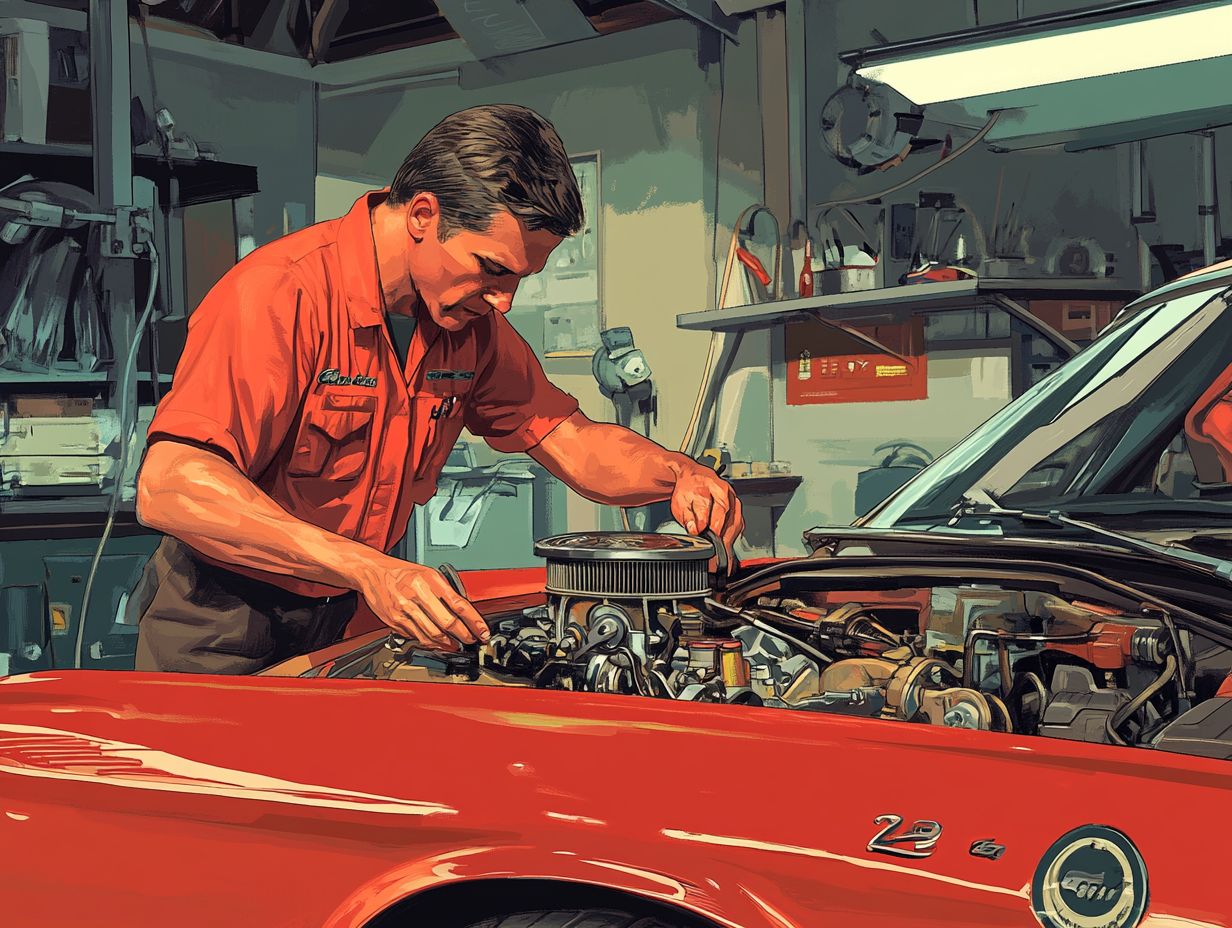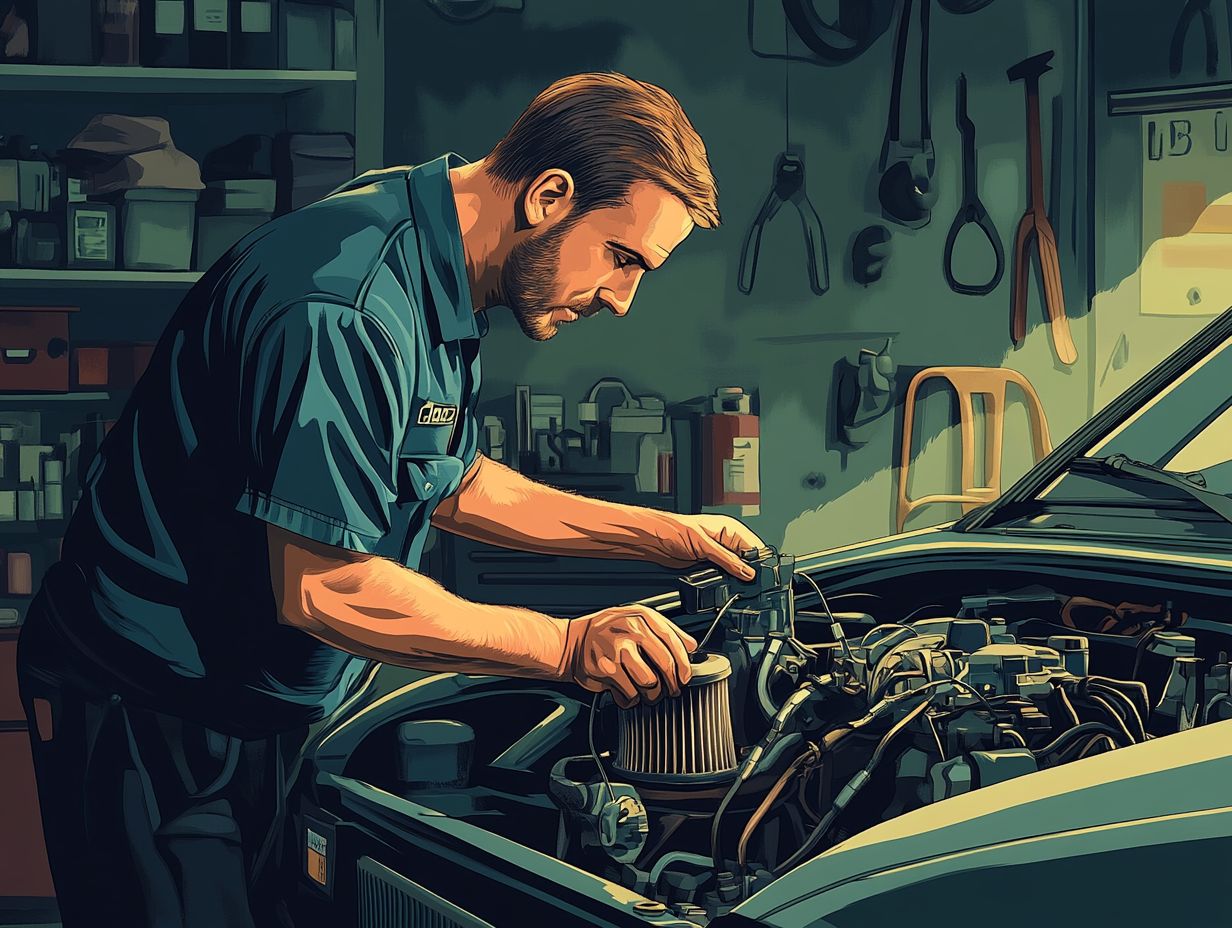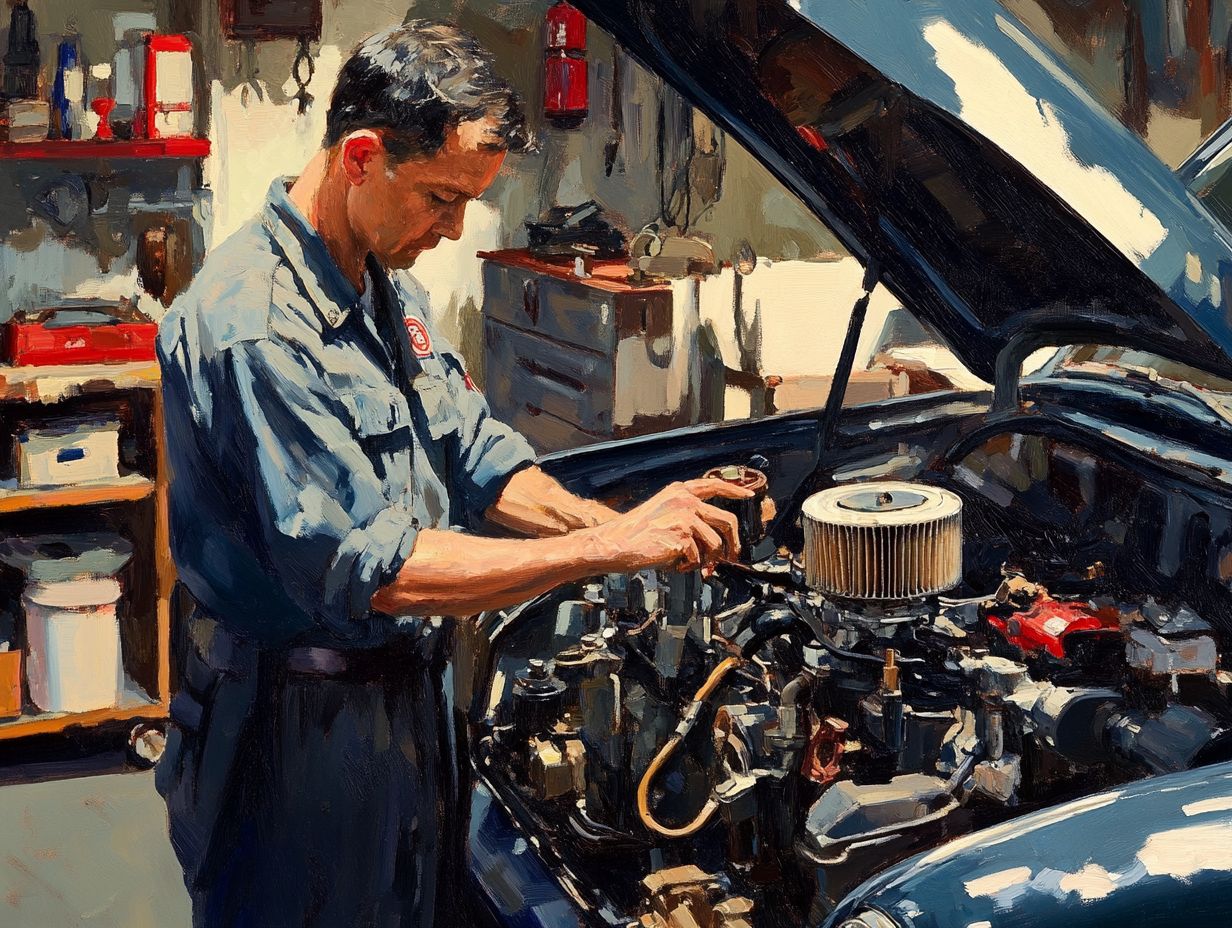Common Symptoms Of A Bad Fuel Filter: 6 Signs To Look Out For
A fuel filter is pretty essential for keeping my vehicle running smoothly. It does the important job of removing impurities from the fuel before it gets to the engine.
Like any other part, it can wear out or malfunction, and that can lead to a bunch of problems. I might find it tough to start my engine, hear some unusual sounds, or notice that my fuel efficiency isn’t what it used to be.
Spotting the signs of a bad fuel filter early can save me both time and money.
I’ll walk you through the common symptoms to watch for and what to do if you notice any of them.
What is a Fuel Filter?

A fuel filter is a really important part of my vehicle’s fuel system. It’s designed to catch any contaminants and impurities in the fuel before it gets to the engine.
By making sure only clean fuel flows through, it helps keep my engine running smoothly and improves fuel efficiency, which is key for my vehicle’s overall health.
If I ignore a clogged filter and don’t replace it, I could end up facing some serious engine problems, issues with fuel delivery, and even speed up the wear and tear on my engine over time.
Signs of a Bad Fuel Filter
I know how crucial it is to recognize the signs of a bad fuel filter if I want to keep my engine running smoothly and avoid any damage to my vehicle.
When a filter gets clogged, I might notice some pretty frustrating symptoms, like reduced acceleration, engine misfires, or even stalling.
By staying alert to these early warning signs, I can save myself from some expensive repairs and boost my fuel efficiency and overall driving experience.
Overview of Common Symptoms
I’ve noticed that the symptoms of a bad fuel filter can show up in a variety of ways, each hinting at possible problems in my vehicle’s fuel system. Common signs I watch for include reduced acceleration, unexpected stalling, and that frustrating struggle to start the engine, all of which make me worry about my car’s reliability.
Sometimes, I can feel the engine acting up, like sputtering during acceleration or just idling roughly. These issues usually come from contaminants clogging the filter, blocking the flow of fuel to the engine. When the filter isn’t doing its job, I might also see a drop in fuel efficiency since the engine can’t get the fuel it needs to run smoothly.
I’ve also noticed that I can hear the fuel pump working harder to push gas through that restricted filter, which is a clear sign that I need to do some maintenance. Spotting these signs early on can definitely save me from more expensive repairs later.
Difficulty Starting the Engine
If I’m having trouble starting my engine, it’s a pretty good sign that my fuel filter might not be working right. This usually happens when the filter gets clogged, which restricts fuel flow and can cause engine misfires or those frustrating, unreliable starts.
Tackling this issue quickly can help me avoid bigger problems down the line and keep my vehicle running smoothly.
Causes and Solutions
When I find myself struggling to start the engine, I often realize that a clogged fuel filter is usually the culprit. It’s like a traffic jam for fuel, blocking it from getting from the tank to the engine. Of course, there are other potential troublemakers, like dirty fuel or a failing fuel pump, so I know I need to do a thorough inspection to get to the bottom of it.
Aside from checking the fuel filter, I’ve got a few strategies up my sleeve for tackling those starting issues head-on. Regular maintenance is key—things like timely oil changes and battery checks really keep everything running smoothly. I make it a point to replace the fuel filter at the recommended intervals to avoid those pesky clogs and keep the fuel flowing.
I also use some troubleshooting techniques, like checking the battery connections or testing the fuel pump’s pressure, to help pinpoint what’s going wrong. And let’s not forget about those potential repair costs! I’ve learned the hard way that ignoring small issues can lead to much pricier repairs down the road. So, staying on top of things is definitely worth it.
Engine Misfires or Stalls

When I experience engine misfires or stalling, it can feel pretty unsettling, and I know it usually means there might be some issues lurking in my vehicle’s fuel delivery system.
I’ve learned that a bad fuel filter can really mess with fuel flow, which leads to that inconsistent engine performance. It’s not just a hassle while I’m driving; it can also cause long-term damage to my engine’s components.
Identifying and Addressing the Issue
Identifying and tackling engine misfires or stalls is all about a systematic approach to diagnostics, with a special focus on the vehicle’s fuel system. I usually start by taking a good look at the fuel filter—it can show me if there’s any dirt or blockage. Catching that early helps me avoid further damage and those dreaded costly repairs.
First off, I always check the fuel pump to make sure it’s pumping out the right pressure. If it’s not delivering enough fuel, I know I’m in for some engine performance woes. Then, I move on to the fuel injectors; I need to check for any clogs or leaks because clean injectors really do make a difference in how well the engine runs.
Next up, I review the spark plugs and ignition coils. Worn-out parts can mess with the ignition sequence and cause those pesky misfires. I also make it a point to keep up with regular maintenance—fluid checks and filter replacements are key to preventing these headaches.
If I’ve done all that and the problems still persist, I don’t hesitate to consult a professional technician. Getting some advanced diagnostics can really shed light on what’s going wrong and help me avoid future complications.
Decreased Fuel Efficiency
If I notice a drop in fuel efficiency, I know it’s time to check on my fuel filter. It really plays a crucial role in keeping my fuel economy in check.
A clogged filter can mess up fuel delivery, making my engine work harder and use more gas, which definitely hits my mileage.
Possible Reasons and Solutions
I’ve noticed a few reasons why fuel efficiency might drop, like a clogged fuel filter, dirty fuel, or just the natural wear and tear of the fuel system components over time. Tackling these issues quickly can really boost my vehicle’s fuel economy and save me from expensive repairs later on.
One thing I find super effective for enhancing performance is sticking to a regular maintenance schedule. This includes changing the fuel filter when recommended. Using high-quality fuel also makes a big difference since it usually has additives that help keep the fuel system clean and running smoothly. By replacing the fuel filter on time, I can reduce strain on the engine and improve overall efficiency.
I also make it a point to do routine inspections of key components, like the fuel pump and injectors. This way, I can catch any potential problems before they turn into bigger headaches, leading to a smoother ride and better mileage overall.
Unusual Engine Sounds
If I’ve been hearing some weird engine sounds while driving, it could mean there’s something off in my fuel system, maybe even a bad fuel filter. Sounds like sputtering or knocking definitely raise a red flag for me.
I know that these performance issues need my immediate attention, or I risk causing even more damage to my engine.
What Could be Causing the Noise?

Unusual engine noises can come from a bunch of different issues, but I often find that a bad fuel filter gets overlooked. When fuel flow gets restricted, my engine may start to struggle, which can lead to some pretty alarming sounds that hint at fuel system problems.
These sounds might show up as sputtering, knocking, or even irregular idling, all suggesting that my engine isn’t getting the right amount of fuel it needs to run smoothly. I’ve noticed that many drivers, myself included, might not immediately connect those noises to the fuel filter, even though it’s essential for keeping the fuel delivery clean.
To figure out what’s going on, I usually start by checking the fuel filter for clogs or any signs of wear. Staying on top of regular maintenance, like replacing the fuel filter as recommended by the manufacturer, really helps avoid these problems and keeps my engine running smoothly without those pesky noises.
Check Engine Light Comes On
When my check engine light pops on, it definitely raises my anxiety levels, especially if it’s hinting at issues with the fuel filter.
Figuring out what this warning light actually means and how it ties into the fuel system really helps me take the right steps to tackle any potential problems before they turn into a bigger headache.
What the Light Means and What to Do
The check engine light can pop on for a bunch of reasons, and one of those could be a failing fuel filter messing with fuel delivery. It’s super important to understand what that light means. If I jump on it right away and get some diagnostics done, I can prevent further damage and keep my repair costs in check.
When the light shows up, my first step is to look for any obvious issues, like a loose gas cap or any strange noises that might hint at a bigger problem. If I don’t spot anything right away, I’ll use an onboard diagnostics tool to read the error codes and figure out what’s going on. Sure, a lot of car owners might want to tackle this themselves, but I often find it smart to get a professional inspection. Technicians really know their stuff and can give me a clearer picture of the issue.
After I’ve run those diagnostics, the repair options could range from something simple, like swapping out a faulty sensor, to more complicated engine repairs, depending on what’s really causing the trouble.
Maintenance and Replacement of Fuel Filters
I know that regular maintenance and timely replacement of my fuel filter are super important for keeping my vehicle’s fuel system running smoothly.
By sticking to the recommended service intervals, I can steer clear of problems with clogged filters that could cause engine damage and lead to expensive repairs later on.
Frequently Asked Questions
What are the common symptoms of a bad fuel filter?

Some common symptoms of a bad fuel filter include hesitation or stalling during acceleration, difficulty starting the engine, decreased fuel efficiency, and engine misfires.
Why is it important to pay attention to these symptoms?
A bad fuel filter can cause significant damage to your engine if left untreated. It can also lead to costly repairs and potential breakdowns on the road.
What causes a fuel filter to go bad?
Dirt, debris, and other contaminants can clog the fuel filter over time, making it less effective. A damaged or worn out fuel filter can also result in these symptoms.
How often should I replace my fuel filter?
It is recommended to replace your fuel filter every 20,000 to 40,000 miles, or as specified in your vehicle’s owner’s manual. However, if you frequently drive in dusty or dirty conditions, it may need to be replaced more often.
Can I replace the fuel filter myself?
While it is possible to replace the fuel filter yourself, it is recommended to have it done by a professional. An incorrect installation can lead to even more problems with your vehicle.
Are there any ways to prevent a fuel filter from going bad?
Regularly changing your fuel filter and using high-quality fuel can help prevent it from getting clogged or damaged. Additionally, avoiding driving on a low fuel tank can also help prolong the life of your fuel filter.
